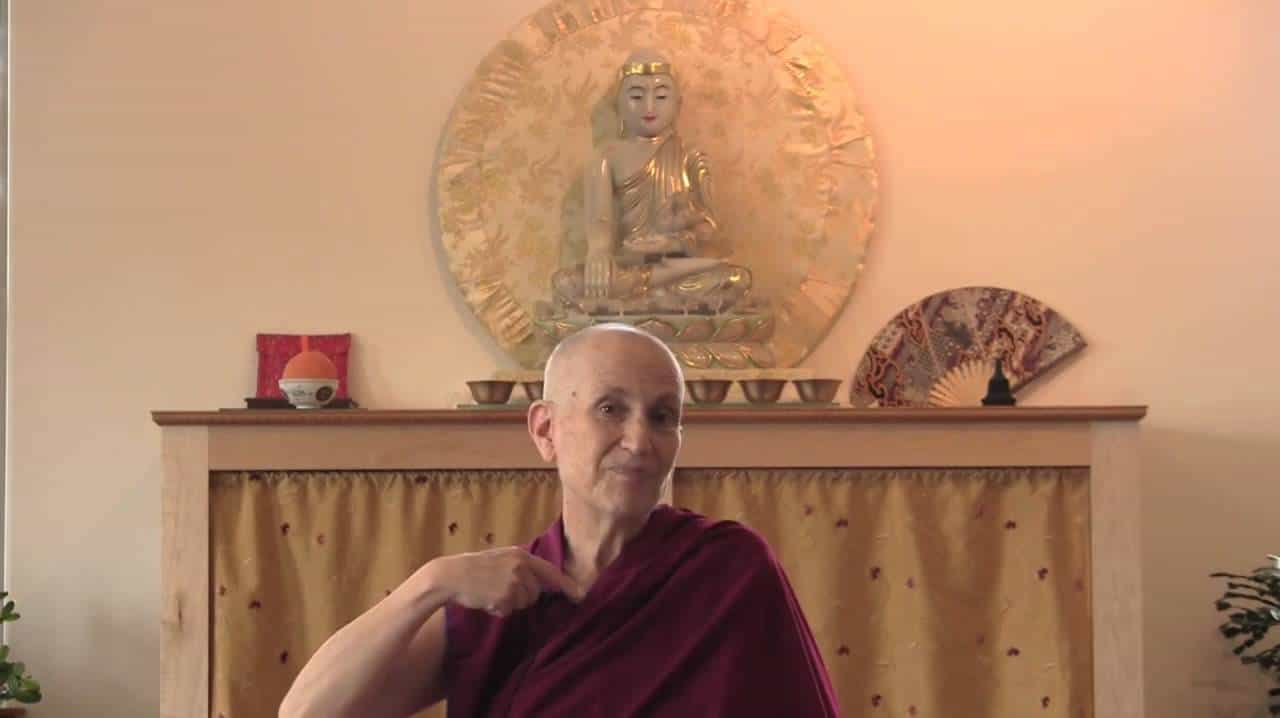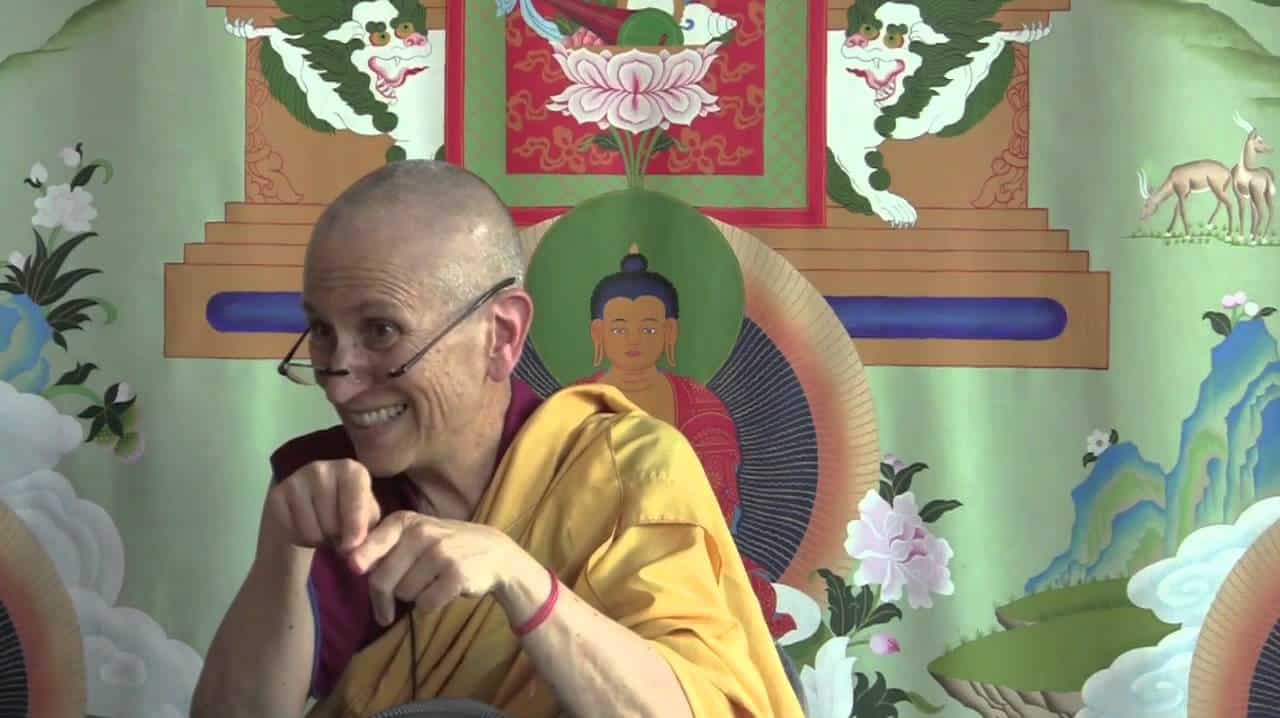Verse 17: The liar
Part of a series of talks on Gems of Wisdom, a poem by the Seventh Dalai Lama.
- People who lie cause others to not trust them
- Lying only digs us into a bigger hole than telling the truth would
- Those who lie are ridiculed when their lie is exposed
Gems of Wisdom: Verse 17 (download)
We just had a very interesting discussion about lying, and the next verse says:
“Who is it that everyone mistrusts and is laughed at by all the world?
The person who constantly lies and attempts to deceive others.”
“That everybody mistrusts.” Yes, for sure. If somebody is lying and we find out—which we usually do—then we don’t trust that person. Similarly, if we lie and they find out that we did, then they don’t trust us either.
I’ve had this situation many times, where people—it’s even been very small things—but they lied instead of telling me the truth, and it’s something that I could have easily handled hearing the truth about. I mean, the truth doesn’t bother me, but lying really bugs me. And I can’t figure out why these people would lie to me when it’s something that…. Yeah, just tell me what happened, it’s okay.
What it does do—I know when people lie to me—is that then I don’t really trust them afterwards. Whatever they say, I think, “What am I getting? Am I getting the truth? Am I getting a watered-down version? Am I getting what they want me to think? Or am I getting what they think I think they think…?” [laughter] You know? What is this person saying to me? Can we have an honest, truthful relationship? I have real difficulty if somebody lies. The trust is really broken.
Then the second line, “Who is it that everybody mistrusts and who is laughed at by all the world?”
Now why would being somebody who lies, somebody who constantly lies and attempts to deceive others. Why are they laughed at by all the world?
[In response to audience] Because they’re foolish because they think you believe them even when you don’t. You just kind of look at that person and say how foolish they are. “You really think I’m going to believe that?”
[In response to audience] That’s true. Once somebody lies about something then you have to usually lie again about something else to weave your first lie…. To make your first lie hold together you usually have to lie about something else, too. And so the lies get more and more incredulous.
Yes, we should really invite Bill Clinton here. [laughter] You know? Didn’t people wind up laughing at him a lot? For what went on? I mean, he looked so foolish in many ways. And John Edwards. Like, you guys really think we’re going to believe that?
Actually, when people lie they often…. Well, so often people find out they’re lying and then they lose respect for that person. That’s probably the meaning that they’re “laughed at by the world,” because people don’t respect them. They don’t take them seriously. And you can spend years building up trust with somebody and then one lie kind of throws all of the trust out the window. So it’s something to be quite careful of.
This didn’t come up in our conversation, but it’s something that I think about in the case of lying. We lie about something that we don’t want people to know about. But why did we do, or NOT do, that action at the beginning? When I look at lying it’s like, “Double, double toil and trouble. Fire burn, and cauldron bubble.” You have the original thing that you did that probably wasn’t so good otherwise why are you trying to cover it up? And then lying about it. And then when somebody finds out first that you lied, they lose confidence. And then they find out the thing that you did in the first place, and they lose more confidence. Whereas if we had just told them what we did at the beginning it probably wouldn’t have been such a big deal. So it’s something really to think about. What effect lying has in our life. When we lie to others. And also when others lie to us what does it to to us?
[In response to audience] You’re saying the reason we’re lying is often to get wealth, praise, sense pleasure, reputation, or to avoid loss, and blame, and notoriety, and bad experiences. But what the lying does is it actually brings the bad experiences that you’re trying to avoid. In the short term you may initially get the good things that you think you’re going to get from it, but eventually it backfires and you lose those. This actually came up in our discussion. You know. “You were lying to avoid shame, but as soon as you lied then you felt ashamed of lying.” So you were doing exactly what you were lying to avoid. Or you were bringing on exactly what you were lying to avoid.
Yes, that is ignorance. And we keep doing it. “This time I’ll lie and there’s such a good reason for it that I really won’t feel ashamed…. And the lie is really plausible, the other person’s not really going to find out…. And I’m doing it for their benefit because they’re really going to fall apart if they find out the truth….” It’s kind of insulting to people, isn’t it? Like, “Oh, I don’t think you’re strong enough to handle the truth, so I have to lie to you.”
[In response to audience]Yes, it can be disrespectful. So we may be telling ourselves, “Well, I’m lying to protect them.” But it’s very often to protect ourselves.
I was thinking about it that sometimes if you’re pretty sure that somebody is going to be upset by something and you just, like, “I don’t have the energy for a drama today,” You know? “Let me just lie then I don’t have to deal with their emotions.” But then there’s the thing, “Well why did I do the thing in the first place?” And, “Is there a way I can say it to the person at the right time and in the right way that might help them understand? And if I did something and somebody’s upset about it, then maybe I have to bear that. It’s unpleasant and I might have to bear it.”
Venerable Thubten Chodron
Venerable Chodron emphasizes the practical application of Buddha’s teachings in our daily lives and is especially skilled at explaining them in ways easily understood and practiced by Westerners. She is well known for her warm, humorous, and lucid teachings. She was ordained as a Buddhist nun in 1977 by Kyabje Ling Rinpoche in Dharamsala, India, and in 1986 she received bhikshuni (full) ordination in Taiwan. Read her full bio.


